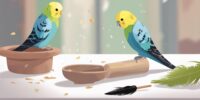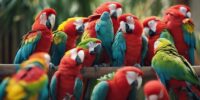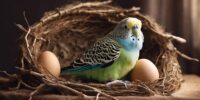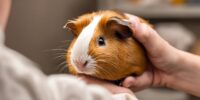How to Identify Safe and Healthy Treats for Budgerigars (Budgies)
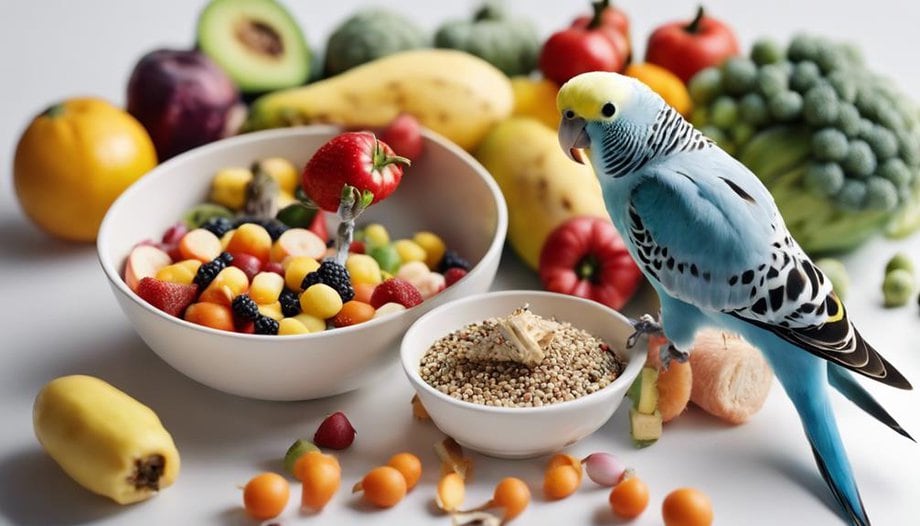
Budgerigars, or budgies, are small parrots that make great pets. When it comes to choosing treats for your budgie, it’s essential to prioritize their health and safety. Here are some tips to ensure you’re providing safe and healthy treats for your feathered friend:
- Fresh Fruits and Vegetables: Offer a variety of fresh fruits and vegetables as treats for your budgie. Some good options include apples, carrots, broccoli, and leafy greens. Make sure to wash the produce thoroughly and remove any seeds or pits that could be harmful to your budgie.
- Seeds and Grains: Budgies love seeds, but it’s important to offer them in moderation. Opt for a mix of different seeds and grains, such as millet, sunflower seeds, and oats. Avoid giving your budgie too many fatty seeds, as they can lead to obesity.
- Nutritional Supplements: Consider adding nutritional supplements to your budgie’s diet to ensure they’re getting all the essential vitamins and minerals they need. Talk to your veterinarian about the best supplements for your budgie’s specific needs.
- Avoid Harmful Foods: Some foods can be toxic to budgies, so it’s crucial to know what to avoid. Never feed your budgie avocado, chocolate, caffeine, or alcohol. These substances can be deadly to birds.
By following these tips and providing a balanced diet for your budgie, you can help ensure they stay healthy and happy. Remember to offer treats in moderation and always consult with your veterinarian if you have any questions or concerns about your budgie’s diet.
Understanding Budgie Dietary Needs
Understanding the dietary needs of budgerigars is essential for ensuring their health and well-being. Budgies require a diet that’s rich in seed diversity to provide essential nutrients and maintain a proper nutrient balance. Incorporating a variety of seeds such as millet, canary grass seeds, and sunflower seeds can help meet their nutritional requirements. However, it’s crucial to ensure that the seeds are fresh and free from any mold to prevent potential health issues.
In addition to seed diversity, pellet supplementation is recommended to ensure that budgies receive all the necessary vitamins and minerals. Pellets offer a balanced diet and can serve as a good base for their nutrition. It’s important to choose high-quality pellets specifically formulated for budgerigars to meet their unique dietary needs.
Furthermore, offering a variety of fruits such as apples, berries, and melons can provide additional nutrients and offer enrichment for budgies. Fruit variety can add excitement to their diet while also promoting overall health and well-being. By understanding and meeting their dietary needs through seed diversity, pellet supplementation, and fruit variety, budgerigars can thrive and lead healthy lives.
Reading Treat Labels Carefully
To ensure the health and well-being of budgerigars, pet owners must carefully read treat labels to make informed choices about their feathered friends’ snacks. Ingredient sourcing is crucial when selecting treats for budgies. Look for natural and wholesome ingredients such as seeds, nuts, fruits, and vegetables. Nutritional value is another key aspect to consider. Opt for treats that are high in essential vitamins and minerals to supplement your budgie’s diet effectively.
When browsing through treat options, pet owners may also want to explore organic options. Organic treats are free from pesticides and chemicals, providing a healthier choice for budgerigars. Additionally, being mindful of allergen concerns is essential. Check treat labels for common allergens such as peanuts or dairy, which could potentially harm your feathered companion.
Avoiding Harmful Ingredients
One crucial step in safeguarding your budgerigar’s health is steering clear of harmful ingredients in their treats. Conducting thorough ingredient analysis is essential to avoid toxic substances that could jeopardize your pet’s well-being. When selecting treats, prioritize those with high nutritional value and steer clear of additives like artificial colors, flavors, and preservatives. Opt for treats that are specifically formulated for budgerigars to ensure they meet the unique dietary needs of your feathered friend.
To guide you in making informed choices, here is a table highlighting harmful ingredients to avoid in your budgie’s treats:
| Harmful Ingredients | Potential Risks | Safer Alternatives |
|---|---|---|
| Artificial colors | Allergic reactions | Natural coloring agents |
| Added sugars | Obesity, diabetes | Natural sweeteners |
| Preservatives | Digestive issues | Treats with no additives |
| High salt content | Kidney problems | Low-sodium options |
Opting for Natural Treats
When selecting treats for your budgerigar, prioritize natural options to ensure their diet aligns with their health and well-being goals. Homemade options can be a fantastic choice, as they allow you to control the ingredients and ensure they’re free from harmful additives. Natural treats offer a wide array of nutritional benefits, such as vitamins, minerals, and essential nutrients that can contribute to your budgie’s overall health and happiness.
Opting for natural treats not only helps in promoting a balanced diet but also adds variety and enrichment to your budgie’s daily routine. Fresh fruits like apples, berries, or vegetables such as carrots and leafy greens are excellent choices. These treats provide a source of hydration, fiber, and important antioxidants.
Consulting With an Avian Vet
Considering the specialized care required for budgerigars, consulting with an avian vet is essential to ensure your feathered friend’s health and well-being are prioritized. Avian vets are trained professionals who can provide valuable vet recommendations tailored to your budgie’s specific needs. When it comes to treat selection, seeking professional advice from an avian vet ensures that you’re offering your budgie safe and healthy options that promote overall well-being.
Avian vets can offer guidance on suitable treats that align with your budgie’s dietary requirements and health status. They can recommend specific treats that cater to your budgie’s nutritional needs while also taking into account any underlying health conditions. Consulting with an avian vet also allows you to address any concerns or questions you may have regarding treat consumption and its impact on your budgie’s health.
Monitoring Treat Consumption
To ensure your budgie’s well-being and health, monitoring its treat consumption is crucial. Portion control and treat frequency are key factors in maintaining a balanced diet for your feathered friend. It’s important to be mindful of the amount of treats your budgie consumes daily, as overindulgence can lead to health issues. By regulating treat portions, you can prevent nutritional imbalances and obesity in your budgie.
Additionally, varying the types of treats offered can cater to your budgie’s preferences and provide a more enriched diet. Observing which treats your budgie enjoys the most can help you tailor their snack options to keep them interested and satisfied. Some budgies may prefer seeds, while others may enjoy fresh fruits or vegetables as treats. Understanding your budgie’s preferences can help you offer a diverse range of treats while still maintaining a healthy balance.
Introducing Treats Gradually
Transitioning gradually when introducing treats to your budgie is essential for their digestive health and overall well-being. It ensures that their bodies can adjust to the new food items without causing any digestive upsets.
Here are four key steps to help you successfully introduce treats to your budgie:
- Start Small: Begin by offering a tiny portion of the treat to see how your budgie reacts. This helps prevent overeating and allows you to monitor their response.
- Monitor Closely: Keep a close eye on your budgie after introducing a new treat. Watch for any signs of digestive issues or allergies.
- Limit Quantity: Control the amount of treats given to your budgie to maintain a balanced diet. Too many treats can lead to nutritional imbalances.
- Observe Regularly: Continuously observe your budgie’s overall health and behavior to ensure that the introduced treats are well-tolerated and beneficial.
Frequently Asked Questions
Can Budgies Eat Nuts as Treats?
Yes, budgies can eat nuts as treats. Nuts offer great nutritional value but should be given in small portions to prevent obesity. Watch for allergies and choking hazards. Always ensure the nuts are safe for budgies.
Are Homemade Treats a Safe Option for Budgies?
Homemade treats can be a safe option for budgies, but store-bought treats are convenient and offer a consistent nutritional balance. Both have their merits, but ensuring a well-rounded diet is crucial for a budgie’s health.
How Often Should Treats Be Given to Budgies?
In maintaining budgie health, treat frequency plays a vital role. It’s essential to strike a balance to ensure nutritional needs are met. Moderation is key; offering treats occasionally will keep the budgie healthy.
Can Budgies Eat Fruits as Treats?
Fruits can be a delightful addition to a budgie’s diet. However, they should be given in proper portions to maintain a balanced seed variety. Moderation is key to keeping these feathered friends healthy and content.
Are There Any Specific Treats That Can Help With Budgie Training?
Training tips for budgies include using positive reinforcement and specific treats like millet spray or small pieces of veggies. Consistency, patience, and praise are key. Reward desired behaviors promptly to reinforce learning.

